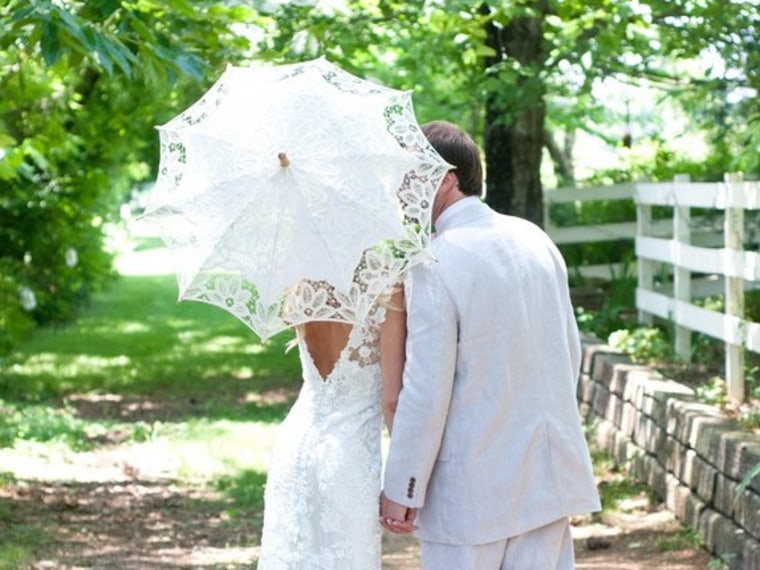Getting jilted by a wedding vendor is, unfortunately, not a rare experience—and as some engaged couples in New York City are now finding out, a particularly painful and expensive one.
Popular Brooklyn, N.Y., wedding venue reBar abruptly closed last week, stranding more than 200 engaged couples who had already paid thousands of dollars in deposits for their upcoming nuptials. Employees reportedly received a short email from owner Jason Stevens, saying the restaurant was "bankrupt and closed." Gothamist has reported that Stevens owed as much as $3 million in unpaid taxes, and disappeared with $27,000 in cash and $150,000 in wedding deposits. CNBC's attempts to reach Stevens were unsuccessful.
"There's so many unanswered questions and so many rumors right now," said Tyler Lindsay, director of special events at reBar. "No one really knows what happened." Employees, he said, were as shocked as the couples.

All-inclusive packages were also offered at reBar, meaning affected brides and grooms have lost not only a reception venue, but also their deejay, florist, food and other services. Couples said that reBar required a deposit of up to 50 percent with regular monthly payments thereafter—and some said they were offered a 5 percent discount if they paid in full upfront.
"Jason [Stevens] spearheaded all the sales," said Lindsay. "He's the one who negotiated all the deals, and made the contracts."
Ranjan Mukhopadhyay and his fiancee, Katie Jarvis, had been chipping away at their balance for over a year and a half, making their final payment to reBar last month, ahead of their July 26 wedding. Their estimated loss: $20,400. "For us, that's our life savings," he said.
"We paid for a wedding, and now we have to pay for another one," said Brian Cavanaugh, whose planned reBar wedding to fiancee Heather Epstein was set for June 7. They paid a total of $19,149 since booking the venue in February 2013. "We thought we were all set," he said.
It's a frustrating situation, and one a surprising number of couples have encountered. "Vendor problems" were the No. 1 reason couples filed a wedding insurance claim in 2012, accounting for 24 percent of reports, according to insurance company Travelers. Of those claims, 21 percent involved a caterer going out of business, and 11 percent involved a deejay not showing up or going out of business.
Wedding insurance is how Josh Rosenberg and Kristina Martin got the rare better outcome to the reBar story. A friend of Rosenberg's had lost deposits due to a 2011 wedding date that coincided with the arrival of Hurricane Irene, and so the couple decided to get a policy in case a winter storm derailed their plans.
"I think we paid maybe $250," he said. "That's nothing for what we got out of it."
After speaking with an insurance agent Monday, Rosenberg said he expects to be reimbursed for the roughly $14,000 in payments the couple made since July 2013. The policy will also cover any deposits lost for other vendors, if their date changes and say, the officiant or deejay isn't available.
"There's usually not a lot of warning," said Alan Fields, co-author of "Bridal Bargains." Worse, couples usually have little recourse to regain funds tied up with a venue. "You're kind of at their mercy," he said. "I wish there was better news."
If the venue files for bankruptcy protection, they can line up with other creditors, Fields said. Couples from reBar have said they also are exploring a civil suit, and talking with law enforcement and the New York state attorney general's office about possible charges.
Other Brooklyn wedding venues and vendors have stepped up in the meantime, offering special packages and rates. Employee from reBar—who were themselves left without paychecks—have also been working with couples to create backup plans and find replacement venues.
"The show of support has been overwhelming," said Lindsay. They coordinated last weekend's weddings at other venues for free, and the restaurant's deejay offered his services for free. "It was the right thing to do," he said.
Couples' friends and family have offered contributions, with many publicly appealing for aid on sites such as Indiegogo and GoFundMe.
Couples still face the challenges, however, of finding a space that works for their date and their now severely depleted budgets.
"We're still in limbo somewhat," said James Gray King, who had planned to marry fiancee Kelly Reilly at reBar on Aug. 3—a date they chose because it was one of the few available. Even at a discount, many prices are still too high given that the couple had already paid reBar more than $10,000.
"We can't afford to be paying for a second wedding when we've already paid for 75 percent of our first," he said.
How to protect wedding funds
Last year, the average wedding budget was $29,858, up 5 percent from 2012, according to wedding site TheKnot.com. That's a lot of money to trust to any business, so it's important to take steps to protect those funds while planning:
Get wedding insurance. "This is a prime example of why buying wedding insurance makes sense," said Jeanne Salvatore, a senior vice president at the Insurance Information Institute. Rates are based on the cost of the wedding and coverage needed, but it's a cheap protection against venue closings as well as other problems such as natural disasters and illness. At Travelers' ProtectMyWedding.com, for example, a $160 policy with no deductible covers $7,500 for lost deposits if a venue suddenly goes out of business as well as an extra $1,500 toward additional expenses of securing a replacement.
Pay with a credit card. Vendors may tack on a credit card processing fee of a few percentage points, but it can still be worthwhile to put at least the deposit on credit. The Fair Credit Billing Act allows consumers to file a dispute if, among other reasons, a product or service purchased was not delivered as agreed. The catch: There's a limit of 60 days from the date of the charge to file a claim, said Linda Sherry, a spokeswoman for advocacy group Consumer Action. Still, it's worth filing a claim. Issuers tend to offer more time leeway with deposits and payment made for a service to be delivered in the future, said Fields.
Mukhopadhyay said he and Jarvis have already filed a dispute over their final payment of $3,500 made last month. "That's still not cash in our pocket," he said—but it could be the only money they get back from reBar.
Scrutinize the payment plan. In most cases, you'll pay an upfront deposit and the remainder of the money owed in the week or two before the wedding, said Fields. "When a photographer says they'd like you to pay in full, or a venue asks for that money completely upfront, that can be a red flag," he said. Ask if there's any leeway on the payment structure, and take extra steps to ensure you're protected.
Assess reviews. "Do your due diligence before you plunk down a deposit with a company," said Sherry. Even a well-reviewed venue or vendor can suddenly go out of business, but there may be warning signs of mounting problems—late delivery, poor communication and so on—in other couples' reviews. It's not a perfect solution: In reBar's case, the venue still has a rating of 4.6 stars out of 5 on WeddingWire, and four out of five on Yelp.
